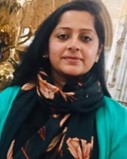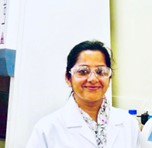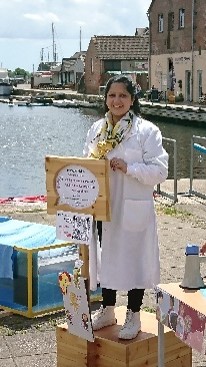Dr Megha Mehta is a post-doctoral research fellow at the University of Exeter’s physics department. She works on developing novel methods that use nanoparticles for non-invasive personalised cancer diagnosis using Surface-enhanced Raman spectroscopy. Here, she tells us about her journey so far in science which included a move to a management role, followed by a comeback to science, where her passion for discovery and knowledge lies. Her blog also describes her journey through a multitude of cultures and environments of the world!
About me: How it all started!
I am from Delhi, India and from here, my academic journey and interest in science began. Science has fascinated me from childhood, and that is why I chose to explore and learn more in the same stream. One of my passions that I started from a young age was reading, which helped me immensely towards my academics. I strongly believe in knowledge gain and sharing it with others, explicitly guiding young minds. I did my Bachelor of Science in Chemistry Honours from Delhi University. In my final year, there were a few experiments on drugs and pharmaceuticals which shelved my interest in drug detection, and I had started looking for courses to pursue my career in nanoscience or forensic science, but that was a rare subject in my city at that time. I decided to do something within the city and changed my stream to management and I left science with a heavy heart. I started working in the management industry but my love for science was still hidden beneath. Marriage brought good luck which has given me an opportunity to fulfil my passion of science and I carried out a Master’s in forensic science not from India but from the University of Technology in Sydney, Australia.
Finally, my long-awaited wish was completed due to the full support of my husband and family.
LOVE FOR RAMAN —-BEGINS IN AUSTRALIA
Fortunately, it was a new beginning for my career which not only enhanced my knowledge but also engaged me in the scientific community to fulfil my desire for intellectual challenge. My first research project during my Master’s degree was on the detection of drugs using Raman spectroscopy, a new technique to me but I know the name ‘Raman’ which is named after Prof. C.V. Raman and that work also led to my first research paper. Raman spectroscopy look at the scattered light. For example: If you shine any blue light onto material, it reflects blue light or no colour if it is black as it will be completely absorbed. But Raman spectroscopy says there is often a tiny fraction of light which is scattered and has different colours after measuring by Raman spectrometer. During the scattering process, the light has changed frequency because, its energy changed by interacting with molecules which vibrates when we shine a light on it. This is the Raman scattering process, named after its discoverer, the famous Indian physicist C.V. Raman. He was India’s first scientist who was awarded the Physics Nobel Prize in 1930 for this great discovery. I was so fascinated with the technique that I decided to do a PhD using this brilliant technique. It is an irony that I had an opportunity to use and learn another fellow Indian scientist’s analytical technique not in India but in another country and I feel so proud that I am one of the scientists working on Raman spectroscopy.
For many years, it was traditionally women who would put their careers on the backburner, but as the predominating culture is changing both at work and at home, women are feeling more and more empowered to pursue a rewarding career while also supporting their partner’s and maintaining a healthy work-life balance. This can only be possible when there is an honest dialogue between yourself and your partner about your respective life and career priorities and the compromises that you are each willing to make, together with a good dose of flexibility, and a supportive supervisor and institution. Balancing studies with married life, made me learn how to become highly organised, and this helped me during the motherhood phase.
If you have a positive outlook towards your goal, you always get positivity back to help you achieve success. After my Masters, I got an opportunity to do a PhD in nanoscience along with a graduate assistant position at Massey University, New Zealand. I never had to wrestle with the question – ‘When is the ideal time to have children? as I already had a two-year-old son when I started my PhD at Massey University. So, if I must give advice to young mums who want to do science it is to – go ahead, if you have a passion for science, you can easily do this even with kids, as they make you more organised and balanced to handle every responsibility with perfection.
Doctorate in Nanoscience from NEW ZEALAND
Generally, like the majority of women I thought that juggling motherhood and family might mean the end of my research career, but it was far from reality for me. My husband encouraged me to fulfil my dream. We moved from Sydney to Palmerston North, New Zealand and he left his job. I worked and studied while he looked after our home and child. I’m lucky. I enjoy how science makes me travel from India to Australia and then to New Zealand for my PhD.
I started my PhD on developing a method to detect, quantify and evaluate chemical and biological toxins in water, food and body fluids which are challenging to detect and identify with high sensitivity. This work can be applied in diagnostics, environmental monitoring, and national security. While completing my PhD, I found out that I was expecting my second child and my mother had breast cancer.
It was a hard time for the family, and I had to keep up my strength. By God’s grace, my mum’s surgery went well, and she is now fully recovered. I managed to submit my thesis (receiving the Dean’s Graduation Award) with the support of a very helpful supervisor and a few days later I was blessed with a baby girl. I am fortunate to have a very supportive husband and family.
Soon after submitting my thesis, I started working as a Research Officer then became a Research Scientist at New Zealand Leather and Shoe Research Association fulfilling my research career and establishing myself in the industry. My role involved introducing the potential of Raman and Infrared spectroscopy in conjunction with statistical techniques to detect the changes in the structure of skins and tissues which helps in identifying and solving problems.
Do what you love, and you’ll never work another day in your life: Arrived Exeter, United Kingdom.
When my mum got breast cancer, at that time I decided, “Now, if I do science as my career choice – I need my science to contribute to society by tackling real-life challenges and producing real-implementable solutions”. This philosophy has always been the core principle behind my scientific research.
Finally, it happened, and I am now here in Exeter, United Kingdom, working on the Raman Nanotheranostics project (RaNT, EPSRC programme grant, Exeter U., STFC, Cambridge U. and UCL) for developing novel injectable nanoparticles for cancer detection, which involves designing and synthesising intelligent gold nano constructs for multiplexed imaging. It is exciting to be able to follow my research ideology and stay true to my passion by focussing on real-life challenges and researching a potential implementable solution.
My work involves designing and synthesizing “intelligent” gold nanostructures with special optical properties, that when injected into the blood of a human can search and reach cancer tumours precisely. They do this by tracking the nanostructures, and the location of the tumour can then be detected by optical spectroscopy (no radiation damages like X-ray or MRI scans to patients). Once detected, light can be used from outside the body to activate these nanoparticles to heat up and kill the cancer cells, allowing therapy without potentially having the deterrent effects of chemo or radiation therapy.
Being a scientist is a never-ending learning curve where you first start learning a technique or researching a new area. Sometimes it fails, but you don’t lose hope and you keep on trying till you get it to work. I feel this is very similar to a child’s learning process: we always tell our children never give up and persevere which is the same principle we should adopt as scientist. I have genuinely valued each experience of doing science with all my family responsibilities. I love science, the research and getting experience in different countries has enhanced my knowledge. This has all helped me to grow as a researcher and as a human being, and all because I continued to pursue what I love to do.
After reading my story, I hope that you have been convinced that science is one of the rewarding careers that makes you research an area you want to explore and it can help you build an international network. Every job involves challenges but the freedom to participate in the significant era of discovery and contribute your work to society makes you feel highly contented at the end of the day! Be positive, confident, and passionate about making things happen, even if there are things that makes it hard to do. Such perseverance will always help you to excel.





